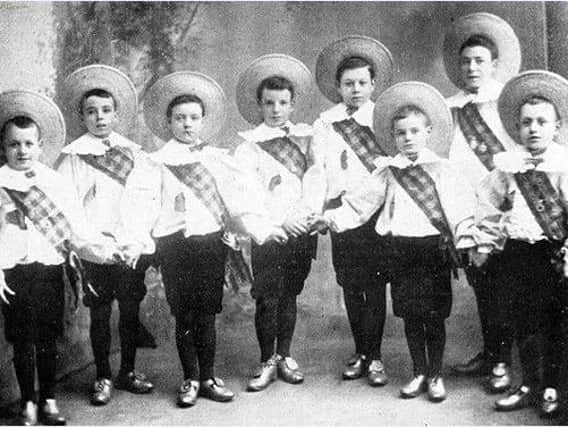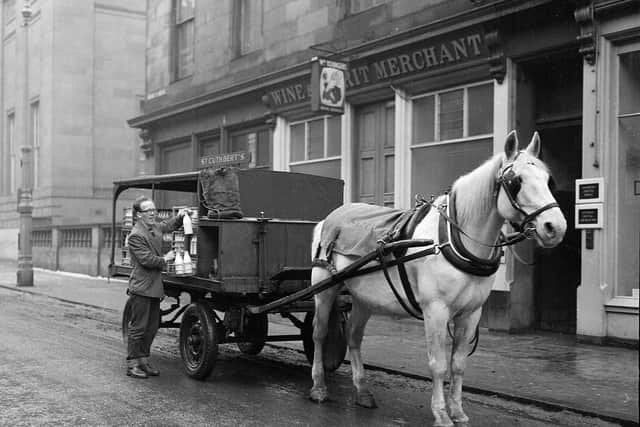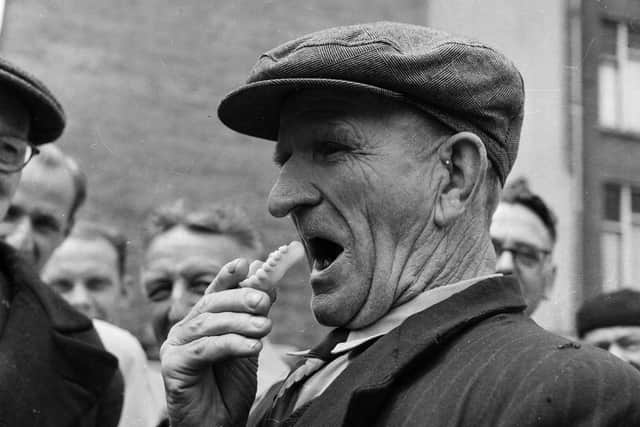New Edinburgh history podcast series reveals Charlie Chaplin once played the Leith Gaiety


Or that Hibs’ legend Mickey Weir kept doos? Or did you know that locals flocked to the dentist to have all their teeth pulled when free NHS dental care was first introduced? Or even, that it wasn’t uncommon for tourists in the 40s to pitch their tents on Portobello beach to save on the cost of digs. These gems are just a few of the nuggets of Edinburgh’s social history that Miles Tubb has uncovered while collecting the memories with The Living Memory Association, based at Ocean Terminal.
Many of these recollections are now being shared in a new series of podcasts entitled The Life Story Podcast. Based on interviews recorded over the last four decades, Tubb has taken the opportunity presented by lockdown to revisit the association’s archives. He explains, “The podcast came about because of lockdown. It’s something we’ve been wanting to do for years as we have a vast sound archive. Having the opportunity while our museum is closed has meant we have been able to start editing and working our way through these reminiscences.”
Advertisement
Hide AdAdvertisement
Hide AdThe archive consists of hundreds of memories collected over the past 32 years and spans centuries. Its subjects, ordinary people with extraordinary tales of everyday life. “It’s about giving people a voice. Formal history tends to be about big events, most of what we do is about everyday life,” says Tubb.


To date, the podcasts, which are available to listen to free of charge on the Living Memory Association website, include 97-year-old Tommy Carson’s memories of growing up in the Grassmarket in the 20s and 30s and footballer Weir’s memories of life in the Granton of the 60s and 70s, the second part of which has just gone live.
Tubb, who admits a life-long fascination with social history, got involved with the project more than 20 years ago. “Our archive is unique because, as far as I know, we are the only project dedicated to collecting these stories which connect people, and that is what we are about,” he says.
One highlight of the archives for the 58-year-old are the interviews he conducted with 105-year-old Mariah Pettigrew between 1999 to 2001.
Advertisement
Hide AdAdvertisement
Hide Ad“She remembered very clearly the opening of the Usher Hall and also the ships sounding their hooters on the Forth at the end of the First World War,” he says. “The fact that she had memories in three centuries was amazing and she was still pretty sharp at 107.”


Stories recalled in the podcasts range from home life to working life. Some seem hard to comprehend today for many. “When we work with schools and tell children that five or six families used to have to share a toilet, it’s incomprehensible to the youngsters,” says Tubb. He continues, “I’ve always been fascinated by these stories, not because I’ve become bored with big history but because they are more interesting, quite often funny and many are emotional.”
At their Ocean Terminal museum, where they welcome 40,000 visitors a year, people who pop in for a visit often end up sharing memories, triggered by the exhibits. Tubb records them there and then, which is how another episode of the podcast came about when one 97-year-old local character happened by. “Tommy Carson spotted himself in a photo, came in and started talking,” he says.
His memories of growing up in the Grassmarket in the 20s and 30s is just one of the recordings now available on the Association’s website. Another podcast recently uploaded is a two-part chat with former Hibs favourite Mickey Weir. “That was recorded just before lockdown,” says Tubb, “How it came about is quite interesting; Ken Buchanan [Edinburgh’s former undisputed world lightweight boxing champion] came in with a pal. His pal said, ‘I know Mickey Weir and he’d definitely be up for coming in for a chat,’ and that was that.”
Advertisement
Hide AdAdvertisement
Hide AdMost of the podcasts, however, focus on people who weren’t household names and many are no longer with us. Folk like Audrey Soutar, born in 1933, who shared memories of the early NHS, while Ena Munro, born in 1949, recalled training as a nurse at the old Leith Hospital.
“We recorded Audrey in 2008 as part of a project to mark 60 years of the NHS,” Tubb explains. “She was a fantastic story teller and remembered working in a dentist and how, with the coming of the NHS, many people wanted to have all their teeth out immediately. It was almost the case that, as part of a birthday present, you would go along to have all your teeth out so that you would get some ‘proper’ nice false teeth. As she says in the podcast, people’s health really wasn’t particularly good back then and dentists experienced a huge rush when the NHS came in because people’s teeth were in an appalling state.”
Milk bars and dance halls feature in another edition in which Maureen Sweeney, born in the 40s, recalls the thrill of nights out in the Capital.
“People lived much more locally in the past, so even going from Leith to Portobello Town Hall for a dance was a big thing,” reflects Tubb.
Advertisement
Hide AdAdvertisement
Hide AdOther episodes introduce listeners to Mary McCaughie who talked of life growing up in 30s Gorgie and James Yorkston whose memories of life in Portobello in the 40s and 50s included tales of people “brewing up tea and camping on the beach”.
“Obviously, they couldn’t pitch their tents on the most popular part as it’s tidal, but apparently they would camp at the Seafield end and in front of the Mitchell’s Building where there was a rough bit a ground called ‘the cowp’ - they camped because they couldn’t afford lodgings. James also recalled doing a milk round with Teddy the horse, when he was 15 - he was up at 5.30am did his round, had breakfast and then went to school.”
It wasn’t unusual for the Capital’s kids to find themselves working either, he adds. “Going further back we have memories of leaving school at 12 or 13 because they had to; their wage was handed over to their mother and was a vital part of the household’s income.”
Memories of life as a ‘call boy’ in the Kings and Playhouse in the ‘50s and ‘80s are shared in another edition by Jean Bell, however, it is a memory of another city theatre that gave Tubb a particular delight in unearthing. Bill Duff, who worked at The Gaiety in Leith in 1945 was a resident at Croft-an-Righ Sheltered Housing when Tubb met him in 2012.
Advertisement
Hide AdAdvertisement
Hide AdOn the recording, he recalls, “We had a great stage doorman, Tommy, he was an old man mind, and I was a lad. Tommy used to tell us all the old stories of The Gaiety. “I don’t suppose many people know this but there was a troupe came there called The Eight Lancashire Lads and one of them was no less a person than Charlie Chaplin. So Charlie Chaplin trod the boards of The Gaiety.”
TOMORROW: Memories of the early days of the NHS and nursing in the 1950s
A message from the Editor
Thank you for reading this story on our website. While I have your attention, I also have an important request to make of you.
In order for us to continue to provide high quality and trusted local news on this free-to-read site, I am asking you to also please purchase a copy of our newspaper.
Advertisement
Hide AdAdvertisement
Hide AdOur journalists are highly trained and our content is independently regulated by IPSO to some of the most rigorous standards in the world. But being your eyes and ears comes at a price. So we need your support more than ever to buy our newspapers during this crisis.
With the coronavirus lockdown having a major impact on many of our local valued advertisers - and consequently the advertising that we receive - we are more reliant than ever on you helping us to provide you with news and information by buying a copy of our newspaper.
Thank you
Joy Yates
Editorial Director
Comment Guidelines
National World encourages reader discussion on our stories. User feedback, insights and back-and-forth exchanges add a rich layer of context to reporting. Please review our Community Guidelines before commenting.